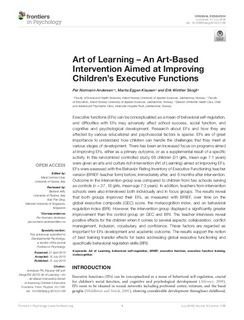| dc.description.abstract | Executive functions (EFs) can be conceptualized as a mean of behavioral self-regulation,
and difficulties with EFs may adversely affect school success, social function, and
cognitive and psychological development. Research about EFs and how they are
affected by various educational and psychosocial factors is sparse. EFs are of great
importance to understand how children can handle the challenges that they meet at
various stages of development. There has been an increased focus on programs aimed
at improving EFs, either as a primary outcome, or as a supplemental result of a specific
activity. In this randomized controlled study, 66 children (31 girls, mean age 7:1 years)
were given an arts and culture rich intervention (Art of Learning) aimed at improving EFs.
EFs were assessed with the Behavior Rating Inventory of Executive Functioning-teacher
version (BRIEF-teacher form) before, immediately after, and 6 months after intervention.
Outcome in the intervention group was compared to children from two schools serving
as controls (n = 37, 18 girls, mean age 7:3 years). In addition, teachers from intervention
schools were also interviewed both individually and in focus groups. The results reveal
that both groups improved their EFs, as measured with BRIEF, over time on the
global executive composite (GEC) score, the metacognition index, and on behavioral
regulation index (BRI). However, the intervention group displayed a significantly greater
improvement than the control group on GEC and BRI. The teacher interviews reveal
positive effects for the children when it comes to several aspects: collaboration, conflict
management, inclusion, vocabulary, and confidence. These factors are regarded as
important for EFs development and academic outcome. The results support the notion
of best training transfer effects for tasks addressing global executive functioning and
specifically behavioral regulation skills (BRI). | nb_NO |

